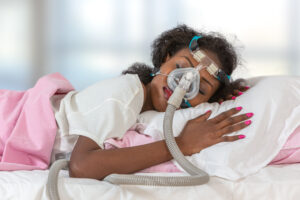Is Sleep Apnea Hereditary? A Look In Sleep Apnea and If You Can Be Born With It.

While there are many factors that can contribute to sleep apnea, there is a strong possibility that it can in fact be hereditary. A family history of this serious condition is not something to take lightly and certainly something you want to discuss with your doctor or seek guidance for. We’re here to ease your mind and answer the questions you may have surrounding the condition if a family member suffers from it.
What is sleep apnea?
Before diving into “is apnea hereditary?” let’s do a quick refresh on what exactly sleep apnea is. Sleep apnea is a potentially serious condition in which your breathing repeatedly starts and stops while sleeping. Typical symptoms or signs you may have sleep apnea are loud snoring, lack of energy, daytime sleepiness (even after a full night’s rest), morning headaches or depression. Risk factors for sleep apnea include type 2 diabetes, high blood pressure, heart disease or an endocrine or metabolic disorder. Age and obesity can also be contributing factors. So now, let’s get into the burning question of “can sleep apnea be hereditary?”
Is sleep apnea genetic?
Considering conditions are most often passed on from generation to generation in families, it would make sense for sleep apnea to be hereditary. This notion is correct in that there is a strong possibility it can in fact be passed down. Studies have suggested that variations in multiple genes, each with a small effect, combine to increase the risk of developing the condition. However, it is unclear what contribution each of these genetic changes makes to the risk of having the disease. Most of the variations were identified in single studies, and subsequent research has not verified them.
So, is sleep apnea a genetic disorder? There isn’t enough data to outright say so one way or the other. But, there is a physical genetic aspect to take into account that could provide support on the notion.
Genetic factors that could impact sleep apnea
Genetically inherited physical traits like your face shape, characteristics of your upper airway muscles, and body fat content and distribution could all contribute to whether or not you are more prone to suffer from sleep apnea. Here’s an example to break down exactly what this means. Let’s say a father of a family has been diagnosed with sleep apnea. One of the children who inherited the father’s facial features — such as a recessed chin, large tonsils, or an overbite among other things — would inherently insinuate that the child would be at risk and could likely develop sleep apnea.
Having a family member who sleep apnea can increase your risk and is worth looking into. Still, have questions on sleep apnea and if sleep apnea is a genetic disorder? That’s what we are here for! Take our virtual sleep apnea risk assessment or request a consultation online to discuss family history with our highly trained experts.

